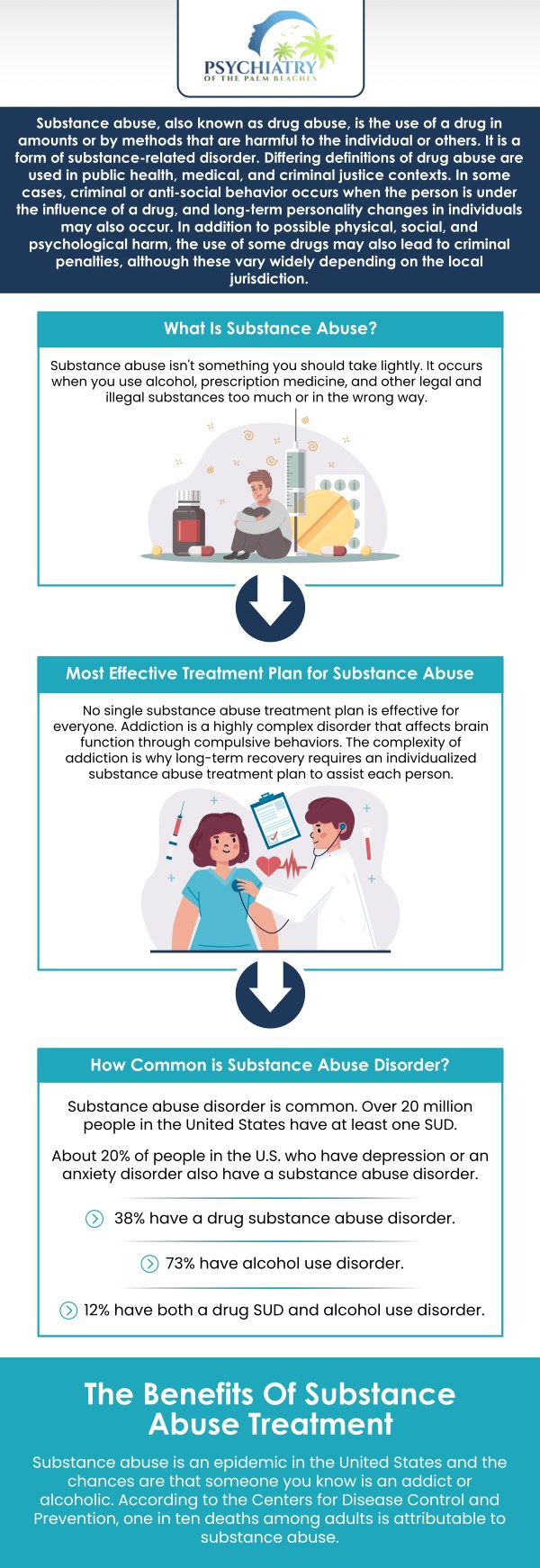Comprehensive Guide to Chemical Abuse Therapy: Recognizing, Methods, and Enduring Recuperation
Drug abuse refers to the dangerous or hazardous use copyright substances, including alcohol and illicit medicines. It is not merely a matter of self-control or poor decision-making-- it's a complicated problem affected by organic, psychological, and social elements. People battling with Substance Abuse typically experience uncontrollable drug-seeking habits in spite of negative consequences in their personal, professional, and social lives. Over time, these substances can change brain function, harm judgment, and develop physical and mental reliance. Recognizing the nature of Substance Abuse is the primary step toward resolving it effectively.
The sources of Substance Abuse are multifaceted. Genes, mental health and wellness problems, environmental stress, injury, and exposure to materials at a very early age can all add to the advancement of addiction. It is frequently interlinked with conditions such as clinical depression, stress and anxiety, or trauma (PTSD) For lots of individuals, alcohol and drugs end up being coping devices-- devices to run away psychological pain or anxiety. Nonetheless, this momentary relief swiftly provides means to long-lasting consequences, as resistance builds and the individual needs even more of the Substance to achieve the very same impact.
Acknowledging the signs of Substance Abuse beforehand can avoid the condition from rising. Common caution indications include adjustments in behavior, disregard of duties, withdrawal from loved ones, monetary troubles, and physical signs and symptoms such as weight management, exhaustion, or poor hygiene. When left without treatment, chemical abuse can result in serious wellness complications, harmed relationships, and even early fatality. Consequently, very early intervention and access to treatment are important for people having problem with dependency.
The Importance of Seeking Substance Abuse Therapy
Seeking specialist treatment for Substance Abuse is just one of one of the most essential choices a person can create their wellness and future - Inpatient rehab. Dependency is not something that can be gotten over by willpower alone-- it requires structured treatment, advice, and regular assistance. Treatment programs are made to address both the physical dependancy and the underlying emotional or psychological problems that drive habit forming actions. Without therapy, the cycle of regression and self-destruction typically proceeds, putting the individual's life and health in jeopardy
The relevance of professional therapy hinges on its ability to provide a safe and regulated environment for recuperation. During detoxification, doctor assist patients handle withdrawal signs and symptoms that can be uncomfortable and possibly dangerous. After counseling, detox and treatment sessions enable individuals to challenge the source of their dependency, create coping abilities, and reconstruct their feeling of self-respect. Therapy additionally helps re-establish healthy and balanced routines, framework, and accountability-- every one of which are important for lasting recovery.
Past the physical and psychological aspects, Substance Abuse treatment plays a considerable duty in restoring partnerships and social performance. Dependency commonly results in broken trust, seclusion, and strained household characteristics. Through household treatment and team sessions, people can rebuild communication and reconnect with liked ones. By entailing household members in the recovery process, therapy programs reinforce the assistance network necessary for preserving sobriety. In essence, looking for therapy is not nearly quitting drugs or alcohol-- it's regarding recovering one's life and producing a structure for a much healthier, extra fulfilling future.
Kinds of Drug Abuse Treatment Programs
There is no one-size-fits-all method to treating addiction. Each person's trip is special, and so are their treatment requires. Chemical abuse therapy programs can be categorized right into several kinds, varying from inpatient recovery to outpatient therapy and holistic treatment. The option of treatment relies on aspects such as the intensity of addiction, the existence of co-occurring mental health and wellness problems, and the individual's way of life and support group.
Inpatient or Residential Treatment provides a highly structured setting where patients reside in a treatment center for a specific period, normally between 30 and 90 days. This kind of program provides day-and-night clinical supervision and intensive treatment sessions. It's ideal for people with severe addictions or those that have fallen back multiple times. Inpatient care gets rid of the person from daily triggers and lures, allowing them to concentrate solely on recuperation. Treatments may consist of cognitive-behavioral treatment (CBT), dialectical behavior modification (DBT), and team counseling, all targeted at aiding people comprehend and handle their dependency.
Outpatient Treatment Programs use more flexibility, enabling people to proceed with their daily duties while attending arranged therapy sessions. This strategy is typically ideal for individuals with mild to moderate addictions or as a step-down phase after completing inpatient rehab. Outpatient programs stress responsibility and long-lasting regression avoidance methods. They may include specific therapy, medication-assisted therapy (MAT), and support groups such as Narcotics Anonymous (NA) or Alcoholics Anonymous (AA)
Along with these, all natural and different treatments are becoming progressively prominent. These programs address the body, mind, and spirit link by incorporating practices such as yoga exercise, reflection, art treatment, and dietary counseling. Numerous facilities also offer dual-diagnosis treatment for those handling both addiction and psychological wellness problems. This detailed technique makes sure that the person gets well-rounded care that advertises recovery on several levels.
The Advantages important Abuse Therapy
The benefits of undertaking Substance Abuse therapy extend much past avoiding medications or alcohol. One of the most immediate benefits is enhanced physical wellness. Lasting chemical abuse takes a toll on the body, affecting essential organs such as the brain, heart, and liver. With cleansing and clinical treatment, the body begins to fix itself, resulting in far better explanation energy levels, enhanced rest, and a stronger immune system. Nourishment and physical fitness programs within rehab facilities even more improve physical recovery.
Psychological and emotional health and wellness benefits are just as significant. Addiction frequently covers up underlying like it mental problems that require to be attended to. During treatment, individuals obtain accessibility to licensed specialists and counselors that aid them browse feelings of guilt, pity, or injury. By developing emotional recognition and strength, individuals discover much healthier means to deal with stress and anxiety and sets off. Cognitive-behavioral therapy (CBT) and various other evidence-based approaches empower individuals to alter adverse thought patterns that contribute to relapse.

Evidence-Based Approaches in Modern Addiction Treatment
Today's Substance Abuse treatment techniques are based in clinical study and professional technique. Evidence-based therapies ensure that individuals receive interventions verified to be efficient. Among one of the most commonly utilized techniques is Cognitive-Behavioral Treatment (CBT), which assists people change and identify thought patterns that bring about Substance use. By comprehending the link in between actions, ideas, and feelings, people can discover to cope with triggers in healthier ways - addiction treatment. CBT is often incorporated with various other treatments to resolve co-occurring problems such as clinical depression or anxiety
One more reliable strategy is Medication-Assisted Therapy (MAT), particularly for opioid and alcohol addiction. Floor covering makes use of FDA-approved medicines such as methadone, naltrexone, or buprenorphine to decrease yearnings and withdrawal signs. When combined with therapy and behavior treatment, MAT substantially enhances treatment retention and reduces relapse rates. It allows people to maintain their lives while concentrating on emotional healing and restoring partnerships.
Group and household therapy are additionally indispensable components of evidence-based treatment. Group sessions develop a space for individuals to share their stories and obtain insights from others in healing. Family therapy, on the various other hand, addresses the relational damages triggered by dependency. It aids liked ones recognize the nature of the disease and furnishes them with devices to offer assistance while establishing healthy and balanced borders. These cumulative restorative approaches strengthen the healing procedure and advertise long-term healing.
Developing a Life After Therapy: Maintaining Long-Term Recuperation
Recovery doesn't end after finishing a therapy program-- it's a long-lasting journey that requires commitment, self-control, and recurring assistance. Transitioning back to everyday life can be challenging, as individuals are confronted with triggers, stress factors, and duties that can evaluate their soberness. This is where aftercare programs play a vital function. Aftercare may consist of continuous treatment, peer support system, sober living arrangements, and relapse prevention planning. The goal is to help individuals preserve the progression they've made and avoid slipping back into old patterns.
Establishing a brand-new way of life fixated health and purpose is vital for long-lasting success. Many individuals discover satisfaction by going after pastimes, physical fitness routines, education, or volunteer work. Building an organized day-to-day regimen assists avoid monotony-- a common trigger for relapse. Reconnecting with household, repairing relationships, and surrounding oneself with positive influences further reinforces a healthy lifestyle. It's likewise vital to identify that troubles can take place, yet they do not specify the individual's journey. What issues most is the desire to look for aid and proceed moving on.
Eventually, sustained recovery has to do with makeover-- physically, mentally, and mentally. It includes redefining one's identification and finding meaning past addiction. Individuals that dedicate to long-lasting healing typically become supporters, mentors, or assistance figures for others having problem with chemical abuse. Their stories of strength act as effective pointers that recovery is possible. With the appropriate therapy, support, and frame of mind, any person can get rid of dependency and develop a meeting, substance-free life.
Final thought: A Course Toward Healing and Hope

Seeking expert therapy for Substance Abuse is one of the most vital decisions a person can make for their health and future. Beyond the psychological check that and physical aspects, Substance Abuse therapy plays a significant function in recovering relationships and social functioning. Substance Abuse therapy programs can be classified into a number of kinds, varying from inpatient rehabilitation to outpatient counseling and all natural care. Inpatient or Residential Therapy offers an extremely structured setting where patients live in a therapy center for a certain period, generally between 30 and 90 days. The benefits of undergoing Substance Abuse treatment extend much beyond abstaining from medications or alcohol.